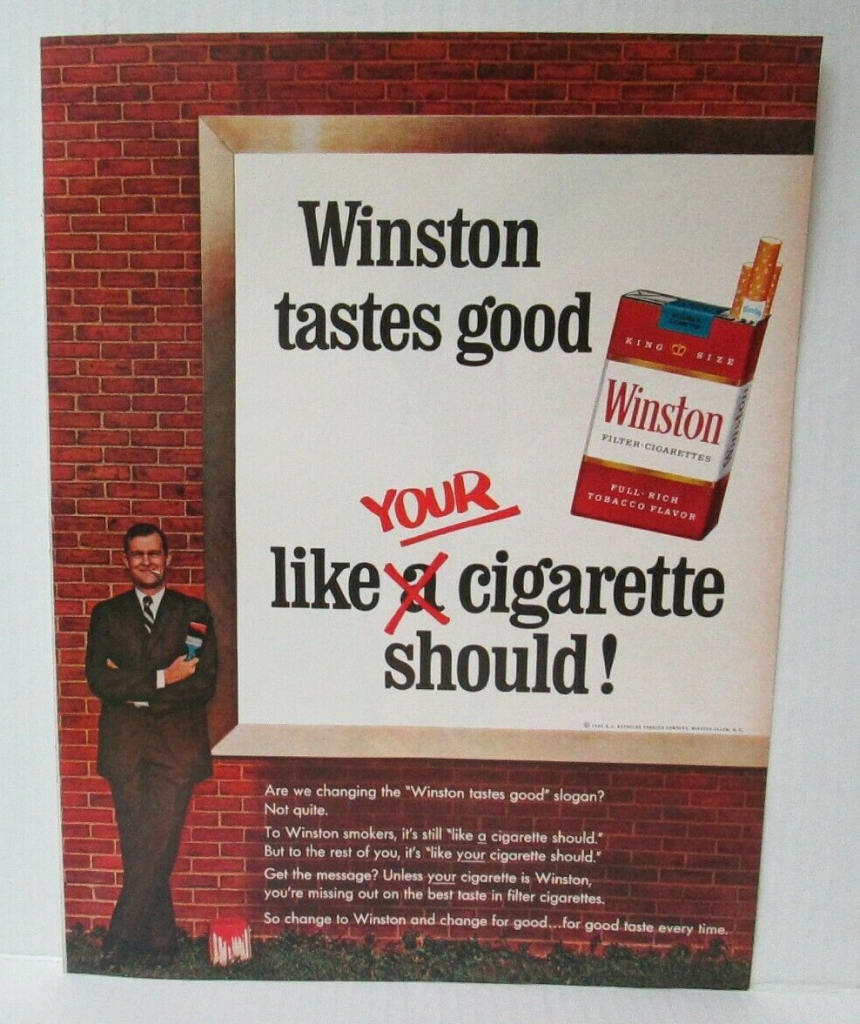Winston, ein Name, der im 20. Jahrhundert als Synonym für Zigaretten steht, spielte eine entscheidende Rolle bei der Gestaltung der Tabakindustrie. Eingeführt im Jahr 1954 von der R.J. Reynolds Tabakunternehmenwurde Winston schnell zu einem Top-Anwärter in der wettbewerbsorientierten Welt der Zigaretten. Bekannt für ihren ikonischen Slogan "Winston schmeckt gut, wie eine Zigarette schmecken sollte", hatte die Marke einen bedeutenden Einfluss auf die Produktentwicklung und Marketinginnovation. In diesem Artikel werden die historischen Beiträge von Winston zur Tabakindustrie, seine Marketingstrategien und seine Entwicklung zu einer kulturellen Ikone untersucht.

Die Geburt von Winston
Winston feierte sein Debüt zu einer Zeit, als die Tabak Industrie rasch expandierte. Die Marke wurde benannt nach Winston-SalemNorth Carolina, wo R.J. Reynolds gegründet wurde. Mit einem sanften Geschmack und einer einzigartigen Marketingstrategie positionierte sich Winston als hochwertige Alternative zu traditionellen Tabakaromen und betonte seine Milde und Konsistenz. Im Gegensatz zu vielen Konkurrenten versprach Winston ein sanfteres Raucherlebnis, vor allem dank der Einführung des Winston-Filterdie als eine mildere, weniger scharfe Zigarette vermarktet wurde.
Winstons ikonische Werbekampagnen
Die Werbekampagnen von Winston spielten eine zentrale Rolle bei der Etablierung des Unternehmens auf dem Markt. Die "Winston schmeckt so gut, wie eine Zigarette schmecken sollte". wurde zu einem der bekanntesten Werbesprüche in der Tabakindustrie. Dieser eingängige und einprägsame Satz fand bei den Verbrauchern Anklang und machte Winston zu einem Begriff.
- Patenschaften: Winston nutzte das Sponsoring, insbesondere im Sport. Die Marke sponserte Großveranstaltungen wie NASCAR und motorsportund verstärkte seine Assoziation mit Männlichkeit, Geschwindigkeit und Kraft. Insbesondere die NASCAR-Partnerschaft ermöglichte es Winston, eine Zielgruppe anzusprechen, die Leistung und Stärke schätzt, und war somit eine ideale Ergänzung.
- Prominente Werbeträger: Wie viele Tabakmarken verwendete Winston Prominentenwerbung um die Attraktivität der Marke weiter zu steigern. Hollywood-Stars und Sportler waren häufig in der Werbung zu sehen und vermittelten der Marke ein aufstrebendes Image. Diese Assoziation mit Prominenten trug dazu bei, den Status von Winston als Premium-Zigarettenmarke zu erhöhen.

Winston und Produktinnovation
Auch bei der Produktentwicklung stand Winston an vorderster Front. Es war eines der ersten Unternehmen, das die "Winston-Filter", die einen sanfteren Rauch versprach. Diese Innovation kam zu einer Zeit, als gefilterte Zigaretten auf dem Vormarsch waren und die Verbraucher weniger raue Raucherlebnisse suchten.
- Menthol-Varianten: Als Reaktion auf die Vorlieben der Verbraucher führte Winston Menthol-Varianten ein, um die wachsende Nachfrage nach mentholhaltigen Zigaretten zu befriedigen. Dieser Schritt ermöglichte es der Marke, ihr Angebot zu diversifizieren und ein breiteres Publikum zu erreichen.
- Leichte Zigaretten: Als die gesundheitlichen Bedenken gegen das Rauchen zunahmen, reagierte Winston mit der Einführung von leichte Zigaretten. Diese Produkte zielten darauf ab, Raucher anzusprechen, die nach einer Alternative mit weniger Teer suchen, und erschlossen den gesundheitsbewussten Markt, der Ende des 20.

Winstons Einfluss auf die Raucherkultur
WinstonDer Einfluss von Winston ging über die Zigarettenmarke hinaus - sie wurde zu einem Teil der amerikanischen Kultur. In den 1960er und 1970er Jahren war Winston in Filmen, Fernsehsendungen und Werbespots zu sehen und wurde oft als die Zigarette der Wahl für den amerikanischen Durchschnittsbürger dargestellt. Die Assoziation der Marke mit dem Motorsport und der Einsatz plakativer Werbekampagnen machten sie zu einem der bekanntesten Namen in der Zigarettenindustrie.
Als jedoch in den 1980er und 1990er Jahren das Bewusstsein für die mit dem Rauchen verbundenen Gesundheitsrisiken wuchs, sah sich Winston, wie alle Tabakunternehmen, einer verstärkten Regulierung und öffentlichen Kontrolle ausgesetzt. Die Bericht des U.S. Surgeon General Die Aufklärung über die Gefahren des Rauchens in den 1960er Jahren hatte bereits begonnen, die öffentliche Meinung zu verändern. Die Attraktivität von Winston begann mit der Zeit zu schwinden, insbesondere bei gesundheitsbewussten Verbrauchern.
Die Entwicklung von Winston auf dem modernen Markt
Winston musste sich angesichts der rückläufigen Zigarettenverkäufe und der wachsenden Gesundheitsbedenken weiterentwickeln. Das Unternehmen hat sich auf die alternative Produkte wie zum Beispiel E-Zigaretten und Vaping-Geräteund versucht, auf einem Markt, der sich zunehmend auf Schadensbegrenzung konzentriert, relevant zu bleiben. Trotz dieser Bemühungen bleibt Winstons Vermächtnis als einer der bedeutendsten Akteure in der Geschichte der Tabakindustrie unbestreitbar.
Schlussfolgerung
Die Rolle von Winston in der Tabakindustrie ist ein Beweis für die Macht von Marketing, Innovation und Markenidentität. Durch geschickte Werbung, Produktinnovation und das Wissen um die Vorlieben der Verbraucher wurde Winston im 20. Jahrhundert zu einer kulturellen Ikone. Obwohl die Marke in der heutigen gesundheitsbewussten Welt vor Herausforderungen steht, bleibt ihr Einfluss auf die Tabakindustrie und die amerikanische Kultur bedeutend. WinstonDie Entwicklung und die Auswirkungen der Tabakindustrie bieten wertvolle Einblicke in die sich ständig verändernde Landschaft der Tabakindustrie.
